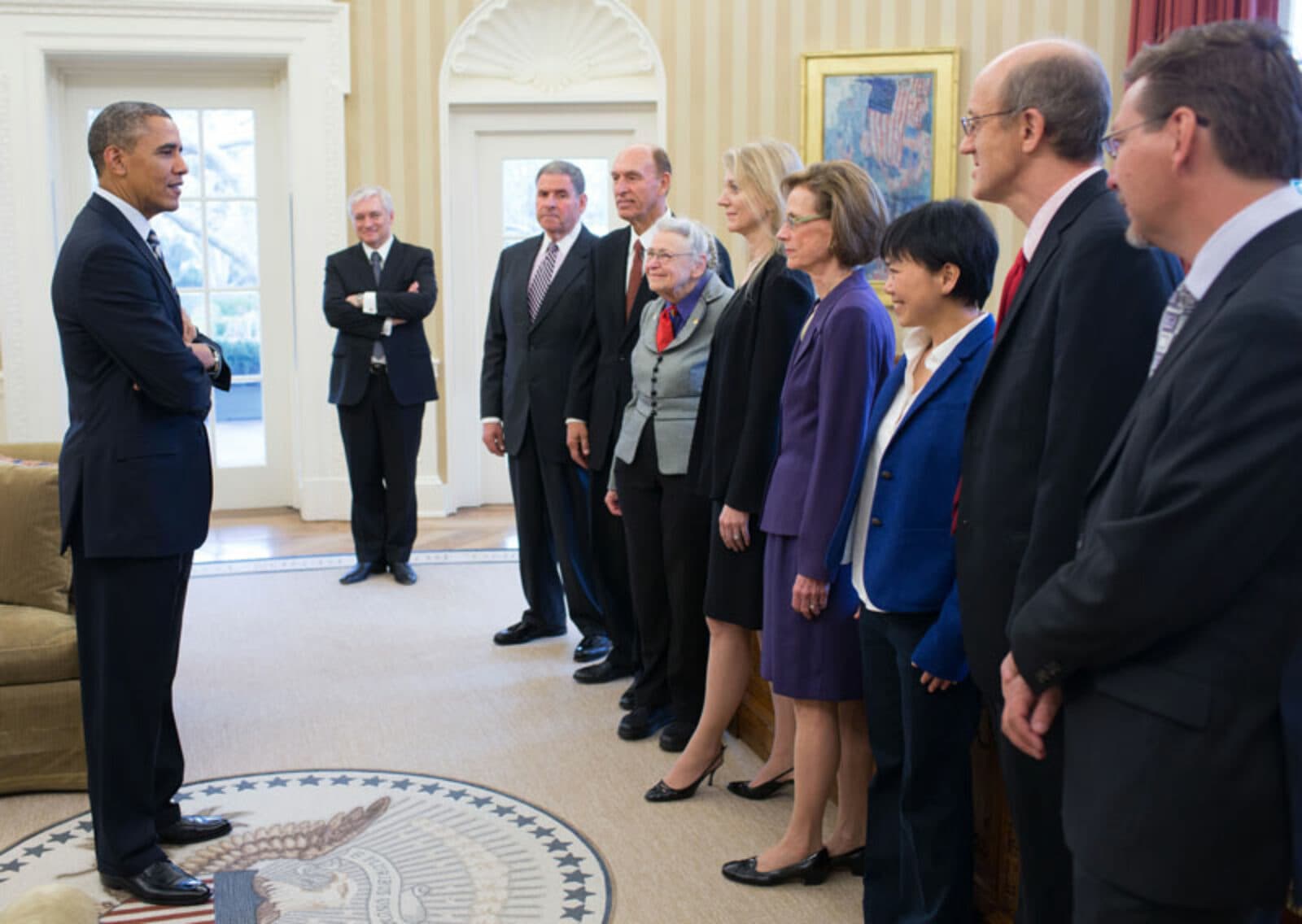President Obama Meets U.S. Laureates of 2012 Kavli Prizes

March 28, 2013
President Barack Obama met in the Oval Office today the six U.S. recipients of the 2012 Kavli Prizes. President Obama received the laureates to recognize and honor their landmark contributions to the three fields for which the Prizes are awarded -- astrophysics, nanoscience and neuroscience.
Joined by the President’s science and technology advisor, John P. Holdren, President Obama greeted Kavli Prize Laureates Cornelia Isabella Bargmann (The Rockefeller University), Michael E. Brown (California Institute of Technology), Mildred S. Dresselhaus (Massachusetts Institute of Technology), Ann M. Graybiel (Massachusetts Institute of Technology), David C. Jewitt (University of California, Los Angeles), and Jane X. Luu (Massachusetts Institute of Technology). Accompanying the laureates were Rockell N. Hankin, Vice-Chairman of The Kavli Foundation, Robert W. Conn, President of The Kavli Foundation, and Wegger Chr. Strommen, the Norwegian Ambassador to the United States.

The Kavli Prizes are a partnership between The Kavli Foundation (U.S.), the Norwegian Academy of Science and Letters, and the Norwegian Ministry of Education and Research.
“We are extremely grateful to the President for honoring the laureates with this visit, and for his continuing commitment to basic science research,” said Fred Kavli, founder and chairman of The Kavli Foundation. “I believe that advancing science is the foundation for a better and healthier world. Science also deepens our knowledge about ourselves and the universe. The 2012 winners of the Kavli Prize are among the scientific leaders of an age where we are making tremendous advances and discoveries."
“American scientists, engineers, and innovators strengthen our Nation every day and in countless ways, but the all-stars honored by the Kavli Foundation deserve special praise for the scale of their advances in some of the most important and exciting research disciplines today,” said Dr. Holdren, who also serves as Director of the White House Office of Science and Technology Policy. “I am grateful not only for their profound accomplishments, but for the inspiration they are providing to a new generation of doers, makers, and discoverers.”
The Kavli Laureates received their awards for making fundamental contributions to our understanding of the outer solar system, to the differences in material properties at nano- and larger scales, and to how the brain receives and responds to sensations such as sight, sound and touch.
The 2012 Kavli Prize in Astrophysics was awarded to David C. Jewitt, Jane X. Luu, and Michael E. Brown for discovering and characterizing the Kuiper Belt and its largest members, work that led to a major advance in the understanding of the history of our planetary system. The Kuiper Belt lies beyond the orbit of Neptune and is a disk of more than 70,000 small bodies made of rock and ices, and orbiting the Sun. Jewitt and Luu discovered the Kuiper Belt, and Brown discovered and characterized many of its largest members, including Sedna, whose exceptionally long and elongated orbit about the Sun has fascinated scientists.
The 2012 Kavli Prize in Nanoscience was awarded to Mildred S. Dresselhaus. The first solo winner of a Kavli Prize, for more than five decades Dresselhaus has made multiple advances in helping to explain why the properties of materials structured at the nanoscale can vary so much from those of the same materials at larger dimensions. Her early work provided the foundation for later discoveries concerning the famous C60 buckyball, carbon nanotubes and graphene. Dresselhaus received the Kavli Prize for her research into uniform oscillations of elastic arrangements of atoms or molecules called phonons, phonon-electron interactions and heat conductivity in nanostructures.
The 2012 Kavli Prize in Neuroscience was awarded to Cornelia Isabella Bargmann, Winfried Denk (Max Planck Institute for Medical Research, Germany) and Ann M. Graybiel, who have pioneered the study of how sensory signals pass from the point of sensation – whether the eye, the foot or the nose – to the brain, and how decisions are made to respond. Each working on different parts of the brain, and using different techniques and models, they have combined precise neuroanatomy with sophisticated functional studies to gain a rounded understanding of their chosen systems.
The Kavli Prize consists of a scroll, a gold medal and a cash award of one million dollars in each field, with the prizes awarded every two years. Kavli Prize recipients are chosen by committees comprised of distinguished international scientists recommended by the Chinese Academy of Sciences, the French Academy of Sciences, the Max Planck Society, the Norwegian Academy of Science and Letters, the U.S. National Academy of Sciences and The Royal Society. After making their selection for Prize recipients, the recommendations are confirmed by the Norwegian Academy of Science and Letters. The formation of Prize Committees and the selection of prize recipients is independent of The Kavli Foundation – a nonprofit U.S.-based foundation dedicated to advancing science for the benefit of humanity, promoting public understanding of scientific research, and supporting scientists and their work.
The 2012 Kavli Prize Laureates were announced last year and received their awards in a ceremony held in Oslo, Norway. The call for nominations for the 2014 Kavli Prizes occurs this fall.